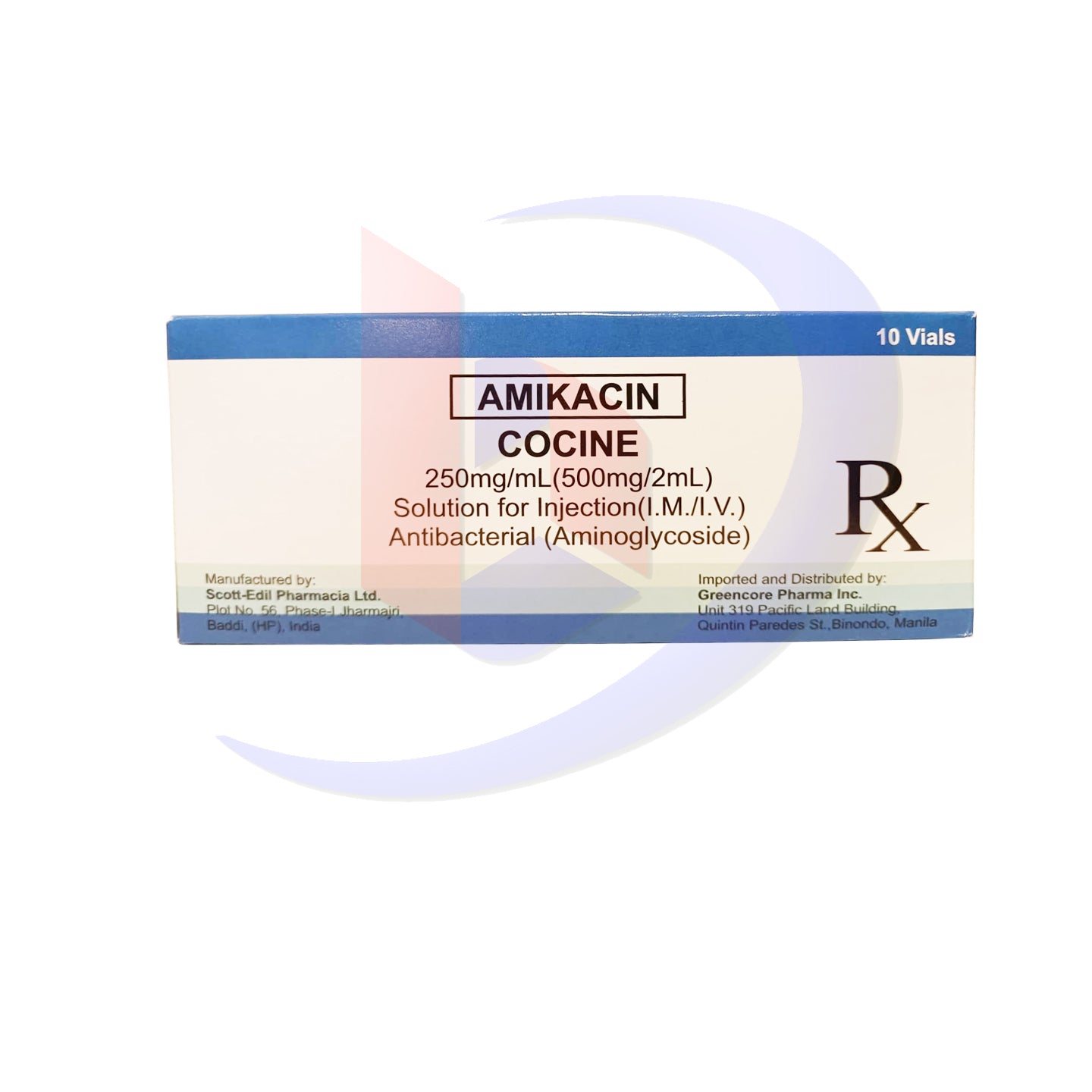Bambang Pharmaceutical Depot Inc.
Amikacin (Cocine) 250mg/ml 500mg/2ml Solution for Injection I.M / I.V Vial 1's
Amikacin (Cocine) 250mg/ml 500mg/2ml Solution for Injection I.M / I.V Vial 1's
Couldn't load pickup availability
Here is the detailed product information for Amikacin (Cocine) 250mg/ml (500mg/2ml) Solution for Injection (IM/IV) Vial 1's:
Product Description:
Amikacin (Cocine) is a broad-spectrum aminoglycoside antibiotic that is used for the treatment of severe bacterial infections caused by susceptible organisms. It is available in a 250mg/ml concentration, with each vial containing 500mg/2ml of amikacin sulfate in solution for injection. This medication is intended for intramuscular (IM) or intravenous (IV) administration and is typically used for more serious infections when oral antibiotics are not effective or feasible.
Amikacin works by inhibiting the growth of bacteria. It interferes with bacterial protein synthesis by binding to the 30S ribosomal subunit of bacteria, which results in bacterial cell death. This makes it effective against a wide range of gram-negative and some gram-positive bacteria.
Indications:
Amikacin (Cocine) is indicated for the treatment of severe bacterial infections caused by susceptible organisms, including:
-
Complicated Urinary Tract Infections (UTIs):
-
Caused by susceptible organisms.
-
-
Respiratory Tract Infections:
-
Severe infections like pneumonia caused by susceptible bacteria.
-
-
Intra-abdominal Infections:
-
Such as peritonitis or infections after surgery.
-
-
Sepsis (Bloodstream Infections):
-
Bacterial infections in the blood.
-
-
Bone and Joint Infections:
-
Caused by susceptible organisms.
-
-
Meningitis:
-
Infections of the brain and spinal cord fluid.
-
-
Endocarditis:
-
Infections of the heart lining.
-
-
Other Serious Infections:
-
Such as soft tissue infections or infections in immunocompromised patients (e.g., cancer patients, those with HIV).
-
Dosage:
The dosage of Amikacin (Cocine) depends on the severity of the infection, the patient's age, weight, and kidney function. A typical dosing regimen is:
-
Adult Dosage:
-
Severe Infections (e.g., pneumonia, sepsis): 15mg/kg/day, divided into two or three equal doses every 8 to 12 hours.
-
Infections caused by less sensitive organisms may require higher doses.
-
Maximum daily dose: 1.5g (1500mg) per day.
-
-
Pediatric Dosage:
-
Children (under 12 years): The usual dose is 15mg/kg/day, administered in two or three equal doses every 8 to 12 hours.
-
Neonates and infants: The dose may be adjusted based on renal function and the severity of the infection.
-
-
Renal Impairment:
-
In patients with renal impairment, the dose may need to be reduced. Dosing adjustments should be based on the serum creatinine levels and creatinine clearance.
-
Hemodialysis: Amikacin is removed by dialysis, so additional doses may be required after each dialysis session.
-
Administration:
-
Intramuscular (IM): Administer the dose as a deep intramuscular injection.
-
Intravenous (IV): Administer as an IV infusion or slow IV push, typically over 30 to 60 minutes.
Duration of Treatment:
-
Treatment duration depends on the severity of the infection, but usually, treatment lasts 7 to 14 days. The therapy should be adjusted based on clinical response and bacterial sensitivity.
Side Effects:
Amikacin, like other aminoglycoside antibiotics, can cause side effects. The common and serious side effects include:
-
Common Side Effects:
-
Injection site reactions: Pain, swelling, or irritation at the injection site.
-
Nausea and vomiting.
-
Loss of appetite.
-
Fatigue.
-
Fever.
-
-
Serious Side Effects:
-
Nephrotoxicity (Kidney damage): Amikacin can cause damage to the kidneys, particularly in high doses or with prolonged use. Kidney function should be monitored regularly.
-
Ototoxicity (Hearing loss): Prolonged use or high doses of amikacin can cause damage to the inner ear, leading to hearing loss or balance problems. This effect is often irreversible.
-
Neuromuscular blockade: Rare, but high doses can lead to weakness or respiratory issues due to interference with nerve-muscle communication.
-
Hypersensitivity reactions: Allergic reactions such as rash, itching, swelling of the face or throat, or difficulty breathing (anaphylaxis).
-
Blood disorders: Rarely, amikacin may cause thrombocytopenia (low platelet count) or leukopenia (low white blood cell count).
-
Elevated liver enzymes: Liver function should be monitored, especially in patients with existing liver conditions.
-
-
Other Potential Side Effects:
-
Dizziness or vertigo.
-
Headache.
-
Muscle weakness.
-
Contraindications:
Amikacin (Cocine) should not be used in the following situations:
-
Hypersensitivity to Amikacin or Aminoglycosides:
-
Contraindicated in patients with a known hypersensitivity to amikacin or other aminoglycoside antibiotics (e.g., gentamicin, tobramycin, neomycin).
-
-
Severe Renal Impairment:
-
Contraindicated in patients with severe renal impairment or end-stage renal disease unless proper dose adjustments are made and close monitoring of kidney function is performed.
-
-
Hearing Impairment:
-
Contraindicated in patients with pre-existing hearing loss due to the risk of ototoxicity.
-
-
Pregnancy:
-
Pregnancy Category D: Amikacin should only be used during pregnancy if the potential benefit justifies the potential risk to the fetus. It can cause fetal harm (e.g., hearing loss). Pregnant women should only use amikacin under strict medical supervision and when no safer alternatives are available.
-
-
Breastfeeding:
-
Amikacin is excreted in breast milk, so it should be used with caution in breastfeeding mothers. The benefits and risks should be carefully weighed, and breastfeeding should be discontinued during treatment if necessary.
-
Precautions:
When using Amikacin (Cocine), the following precautions should be considered:
-
Kidney Function:
-
Renal function should be monitored during treatment, especially in elderly patients, those with pre-existing kidney conditions, or those receiving other nephrotoxic drugs. Dosage adjustments may be necessary in patients with renal impairment.
-
-
Hearing and Balance:
-
Ototoxicity is a significant concern with aminoglycosides. Audiometric tests may be recommended for patients receiving prolonged treatment or higher doses. Hearing loss may be permanent and is often dose-dependent.
-
-
Neuromuscular Disorders:
-
Amikacin should be used with caution in patients with neuromuscular disorders (e.g., myasthenia gravis) due to the risk of neuromuscular blockade and respiratory issues.
-
-
Use in Elderly:
-
Older adults are more susceptible to nephrotoxicity and ototoxicity. Close monitoring of renal and hearing functions is advised.
-
-
Pregnancy and Breastfeeding:
-
As mentioned, Amikacin should be avoided during pregnancy unless absolutely necessary. The potential for fetal ototoxicity exists, especially when used in the third trimester. Breastfeeding mothers should consult their healthcare provider before using amikacin.
-
-
Prolonged Use:
-
Long-term or high-dose therapy should be avoided unless absolutely necessary, and renal function and hearing should be monitored frequently.
-
Summary:
Amikacin (Cocine) 250mg/ml (500mg/2ml) is a potent aminoglycoside antibiotic used for the treatment of severe bacterial infections, including respiratory, urinary tract, intra-abdominal, and bloodstream infections, as well as others like meningitis and bone infections.
The typical dosage is 15mg/kg/day, divided into 2-3 doses for adults, with adjustments for renal function. Common side effects include nausea, vomiting, and fatigue, while more serious risks include nephrotoxicity and ototoxicity. It should be avoided in patients with known hypersensitivity to aminoglycosides, severe renal impairment, or hearing loss.
Amikacin should be used with caution, and patients should be monitored regularly for kidney function and hearing during treatment.
Share

Product Features
Highlights
Details
Lot #
Expiry Date
"For All Your Pharma And Medical Supply Needs"
-
MEDICINES
We offer large range of generics and branded tablets, capsules, topicals, suppositories, drops or suspensions, inhalers and injections.
-
SUPPLEMENTS
High quality yet very affordable vitamins and minerals, specialty supplements, herbals and botanicals, sports nutrition, and weight management.
-
MEDICAL SUPPLIES
We serve all types of medical supplies needed in clinics, laboratories, and hospitals like cottons, gauze, alcohol, swabs, gloves, bandages, lancets, glucometer, etc.
-
MEDICAL EQUIPMENT
We also serve durable and affordable medical devices and equipment needed in clinics, laboratories and hospitals.
Subscribe to our emails
Be the first to know about new collections and exclusive offers of Bambang Pharmaceutical Depot Inc.


